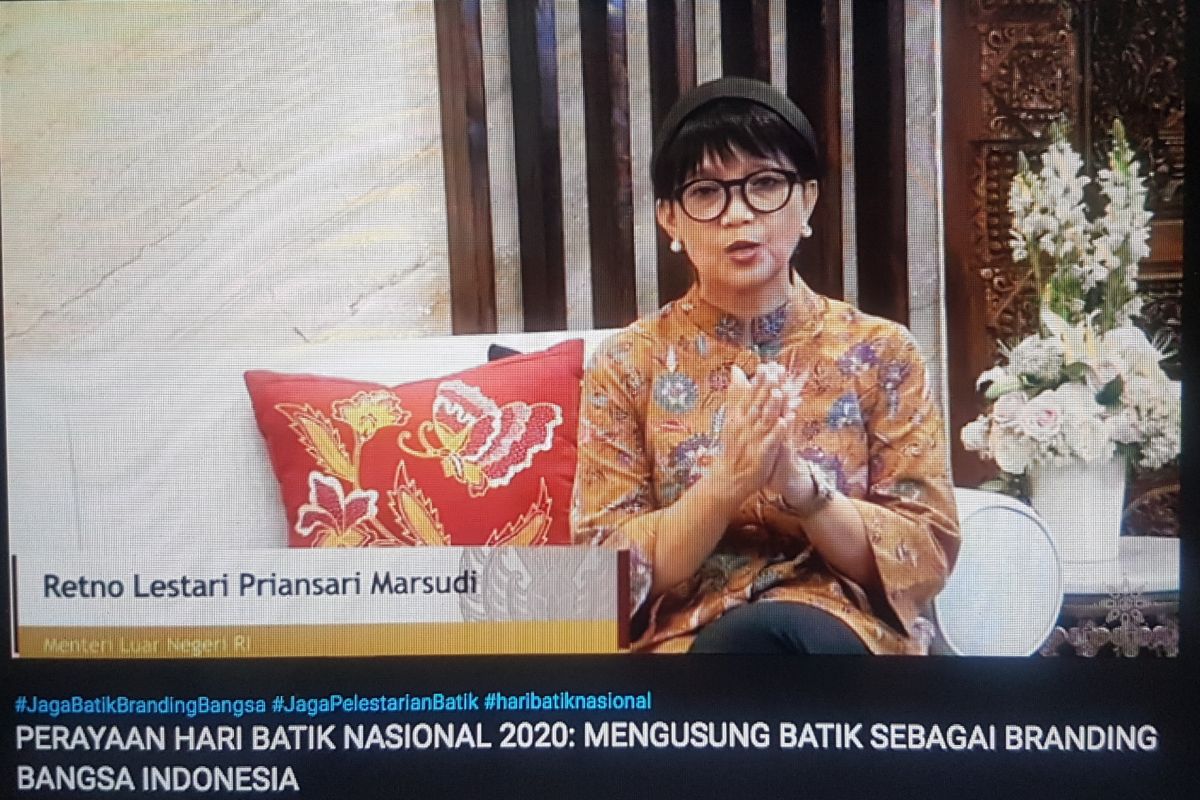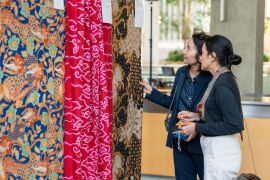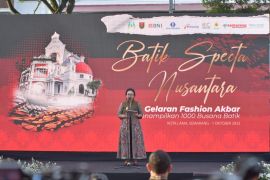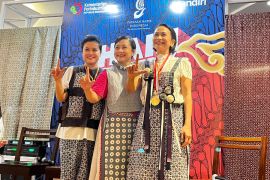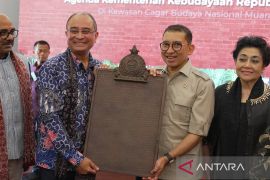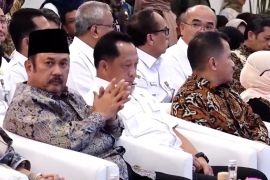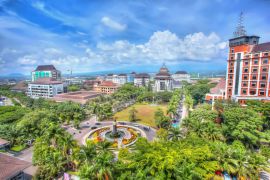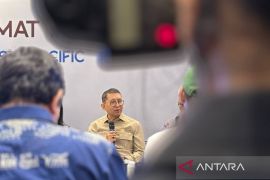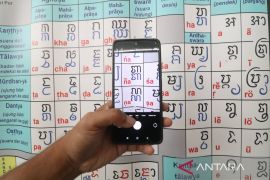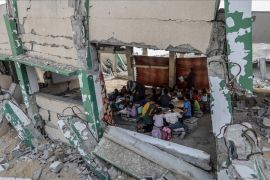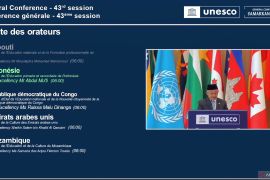The willingness of delegates from friendly countries to wear Indonesian batik is a form of respect and a concrete example of Indonesian batik diplomacyJakarta (ANTARA) - Commemorating special days this year does feel a little different from the normal days due to the COVID-19 pandemic. Everyone seems to be forced to digitally switch, including while celebrating National Batik Day, which falls on 2 October every year.
Adjusting oneself with technology may not be a difficult thing, but it needs adaptation. This rule is also applied for batik craftsmen and producers.
Chairman of the Association of Indonesian Batik Artists and Craftsmen Dr. H. Komarudin Kudiya said that the pandemic had forced people, including entrepreneurs and batik craftsmen to switch to digital communication.
"We continue to communicate, even work together and make weekly webinars about batik and donations to local batik craftsmen," Kudiya said in a virtual discussion.
As a note, in April this year, the Indonesian Textile Association (API) recorded a reduction of 2.1 million workers in the textile and textile product industry due to the pandemic.
Komarudin also said, currently there are many home batik craftsmen with capital of under Rp200 million in Cirebon, West Java, to Pekalongan, Central Java, who have to go out business because there is no demand. This also happens to the embroidery and weaving industries.
An activist of the Indonesian Batik Foundation Dr. Tumbu Ramelan said that the ones most affected are micro, small and medium scale enterprises (MSMEs) or grassroots industries.
"So far, batik entrepreneurs have reported that their sales have dropped dramatically by about 30 percent," Ramelan noted.
Therefore, he argues that the introduction to technology must be made to help the industry, which includes 200 thousand batik makers in Indonesia.
Providing online batik-making training and selling batik through online platforms, then raises the question: can the values and philosophy of this piece of traditional Indonesian fabric be preserved, just the same as buying and learning directly from local craftsmen?
Ramelan argues that every batik pattern has a message and universal values that can be learned, regardless of the purchasing or training platform, which switches to digital media.
The techniques, symbolism and culture surrounding hand-dyed cotton and silk garments known as Indonesian Batik have made it to the list of the UNESCO intangible cultural heritage in 2009.
Foster love
A sense of pride arises when UNESCO and the world have recognized batik as a cultural heritage.
However, such achievement needs to be supported by the involvement of the community and government, and the pandemic is not a reason to stop echoing the aesthetic splendor and value of batik.
The easiest way for today's generation to preserve batik is to wear it and be proud when wearing it.
"Starting to love batik is very simple. Wear batik. By wearing batik, indirectly you are acquainted with batik. And of course you should be proud when wearing it," Ramelan said.
According to him, batik is a traditional cloth that can be worn in many important moments --- starting from birth, marriage, to the end of life. Batik has many interesting values and philosophies to explore, and remains relevant despite the changing times.
Currently, fashion designers and batik craftsmen have also tried to engage young people to wear batik by making innovations in color and motif.
"In the past, batik was identical to its dark color, now we are creating batik with pastel colors and simpler motifs which are expected to suit the tastes of young people," Ramelan noted.
However, the preservation of batik requires sustainable efforts and the involvement of many parties, including the government and the community.
"We need government involvement too. Communities move, craftsmen move. Batik is an art that is done by artisan and of course it should have a special place. There should be sustainability of the entire ecosystem in it," Ramelan explained.
Foreign Minister Retno Marsudi, who uses diplomacy to preserve and promote batik to the international community, echoed a similar thought.
On many occasions, Indonesian diplomats wear batik clothes and other Indonesian fabrics to introduce one of the nation’s cultural richness.
Last year, at a UN Security Council meeting in which Indonesia held its presidency, almost all state delegates who attended also wore batik.
"The willingness of delegates from friendly countries to wear Indonesian batik is a form of respect and a concrete example of Indonesian batik diplomacy," Retno Marsudi stated.
In order to respond to the tough challenges of advancing the livelihoods of Indonesian batik craftsmen, especially during the pandemic, all Indonesian embassies have been instructed to buy batik produced by SMEs as a tool of promotion.
"Until now, there has been a (purchasing) commitment of Rp1.6 billion," she said.
Online platform
The online platform, which is used by the global community to fulfill their needs, work, and respond to the challenges of the pandemic --- is now also being used by batik industry to survive.
Online marketing through social media as well as buying and selling through e-commerce was even more intense during the COVID-19 pandemic, which forced people to limit their outdoor activities and improve personal hygiene.
Indonesian online marketplace, Tokopedia, revealed that masks and negligee were the best selling products on its platform based on data on batik sales trends during the pandemic.
Tokopedia External Communications Senior Lead Ekhel Chandra Wijaya said that batik sellers on its platform did not stop creating innovations that were more relevant to today's society.
"It can be seen from the best-selling batik products in Tokopedia, namely masks and negligee or batik-patterned nightgowns. These data really illustrate the needs of people who now spend more time at home to avoid COVID-19 transmission," he said.
Based on these data, sales of batik negligee or nightgowns increased 3.5 times compared to the period before the pandemic. Meanwhile, sales of batik masks increased significantly by more than 20 times.
Ekhel said the COVID-19 pandemic is a momentum for business people in Indonesia, especially MSMEs, to create opportunities by innovating, both in terms of products and sales channels, from offline to online.
According to him, MSMEs who use digital channels are more resilient in facing the COVID-19 pandemic because they can maintain business continuity while ensuring job opportunities remain available.
"We believe that MSMEs have a significant role in the recovery of the economy of the country affected by the pandemic, considering that they are a contributor to more than 60 percent of state revenue," Ekhel said, adding that MSMEs engaged in the batik industry need to be supported by all parties.
Coinciding with the National Batik Day, the Tjanting Batik Nusantara Foundation also launched a digital batik market center "Kuklik Batik" in order to market batik more widely through digital platforms.
"Kuklik Batik" is committed to marketing three types of curated batik fabrics, namely printed batik, hand-stamped batik and fine-written batik.
In collaboration with several ministries, the foundation presents “Kuklik Batik” as a solution to the limitations of marketing batik, which can no longer use old methods such as exhibition.
"Through ‘Kuklik Batik’, the digital market for Indonesian batik cloth from batik centers throughout the archipelago can be widely marketed, not only locally but also internationally," Chairman of the Board of Trustees of the Pheo M. Hutabarat Foundation said.
Related news: Use technology in batik industry for increasingly competitive products
Related news: Batik exports soared in midst of COVID-19 pandemic: minister
Editor: Fardah Assegaf
Copyright © ANTARA 2020
